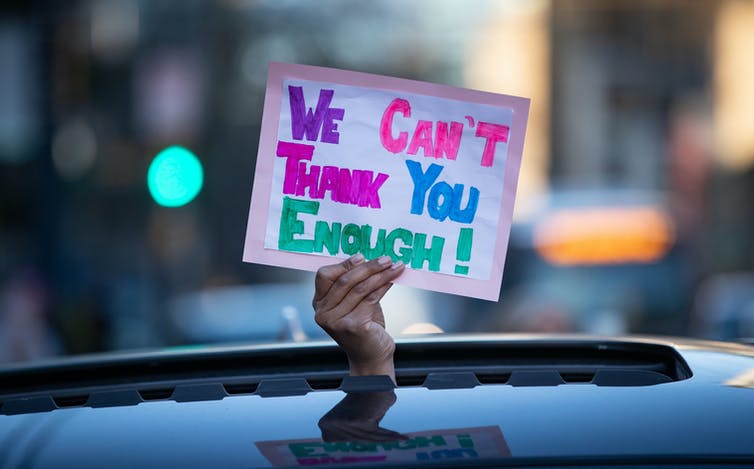 A person holds a sign through the sunroof of a car in support of health-care workers outside St. Paul’s Hospital in Vancouver, on April 5, 2020. THE CANADIAN PRESS/Darryl Dyck
A person holds a sign through the sunroof of a car in support of health-care workers outside St. Paul’s Hospital in Vancouver, on April 5, 2020. THE CANADIAN PRESS/Darryl Dyck
When a major earthquake beneath the Indian Ocean on Dec. 26, 2004, resulted in a devastating tsunami, people from all parts of the world contributed to one of the largest relief efforts ever.
It’s part of human nature to want to help. Even before being able to talk, infants can recognize a non-related adult in need and offer help. In adults, areas of the brain associated with stress relief and reward have a greater response to giving than they do when receiving something.
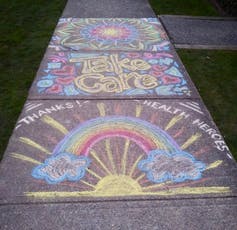 Saying thank you is one of the easiest and most heartfelt things we can do. (Scott Lear), Author provided
Saying thank you is one of the easiest and most heartfelt things we can do. (Scott Lear), Author provided
Spending money on others also appears to have a unique role in increasing happiness. Even small acts of kindness such as mowing a neighbour’s lawn or washing a roommate’s dishes can reduce anxiety.
The coronavirus pandemic represents a generational crisis with many people in need. From those who are sick with the virus to people self-quarantining to people suffering through financial difficulties. As a result, people are looking for ways to help. But being house-bound and social distancing makes helping a challenge, so here are seven ways you can help those in need:
1. Stay at home
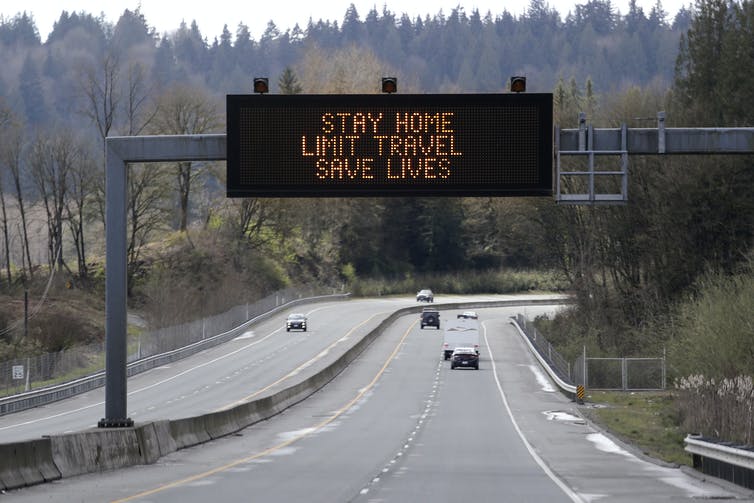 A sign overhead on an unusually quiet highway in Monroe, Wash., reminds drivers to ‘Stay home, limit travel, save lives’ on April 1, 2020. (AP Photo/Elaine Thompson)
A sign overhead on an unusually quiet highway in Monroe, Wash., reminds drivers to ‘Stay home, limit travel, save lives’ on April 1, 2020. (AP Photo/Elaine Thompson)
It might not seem like much, but until a vaccine is available, staying at home is the best defence against the spread of coronavirus. As British Prime Minister Boris Johnson said regarding the United Kingdom’s Mother’s Day, “…the single best present that we can give … is to spare them the risk of catching a very dangerous disease. The sad news is that means staying away.”
2. Call family or a friend
While staying at home is our best defence, it can be socially isolating, especially for those who live alone. But being physically apart doesn’t mean you have to be socially apart. Hearing a familiar voice can relieve stress and anxiety by releasing oxytocin. And with phone apps and online programs, you can get real face time and share a smile, which activates areas in the brain associated with happiness.
3. Support local businesses
The retail areas of our cities have turned into ghost towns. Many businesses are without daily income to pay rent and salaries. Local restaurants and stores may not survive. And with that, their staff will be out of work. However, many places sell products online and offer gift certificates, which can provide an immediate injection of money.
4. Donate to your local food bank
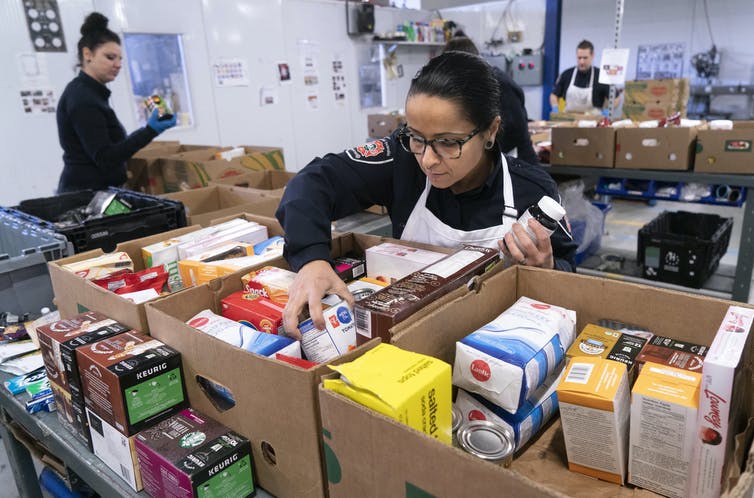 A Montréal firefighter volunteers at Moisson Montréal food bank in Montréal on March 27, 2020. THE CANADIAN PRESS/Paul Chiasson
A Montréal firefighter volunteers at Moisson Montréal food bank in Montréal on March 27, 2020. THE CANADIAN PRESS/Paul Chiasson
Even with support for local businesses and government funds being poured into society, a lot of people are struggling financially. Some people will need to turn to their local food bank for emergency food. At the same time, food banks are experiencing a decrease in donations. You can donate money online to food banks, which goes further than non-perishable food donations due to bulk purchases.
5. If you can go out, lend a hand
If you’re not in quarantine or at high risk (over 65 years of age or have a pre-existing medical condition), you can always lend a hand to a neighbour. You may know someone who can’t or shouldn’t go out for daily essentials such as food and hygiene products.
Consider making extra purchases on your next grocery store run and drop off the items at their door. If you don’t personally know anyone in need, but still want to lend a hand, there are websites such as VancouverSupport.ca that allow you to post offers of help. There is also Nextdoor, an app that lets people view what help their neighbours need. And if you need help yourself, you can also post your needs there as well.
6. Donate blood
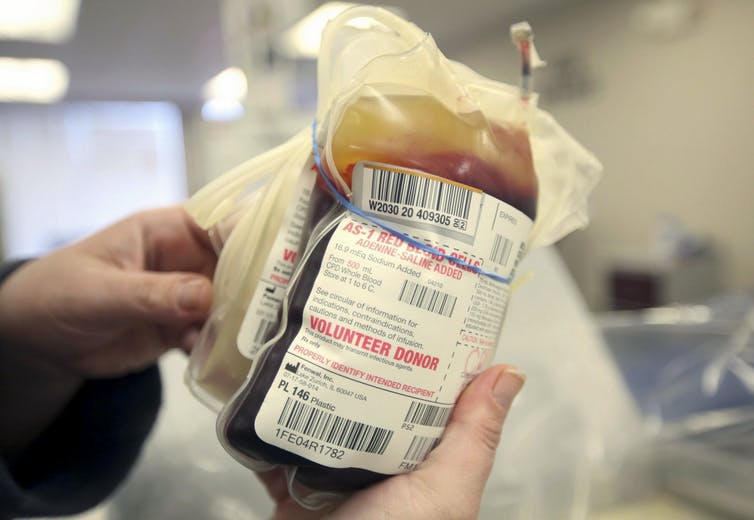 There is a greater need for blood donations right now because fewer people are donating during the pandemic. (Jake Danna Stevens/The Times-Tribune via AP)
There is a greater need for blood donations right now because fewer people are donating during the pandemic. (Jake Danna Stevens/The Times-Tribune via AP)
There is a greater need for blood donors right now. Not because treating the coronavirus requires blood transfusions, but because the pandemic has reduced the number of people who are donating.
In addition, the requirements of social distancing have resulted in donor clinics reducing appointments. These clinics have also put in stringent measures to ensure the safety of donors and have stopped accepting walk-ins, so you will need to book an appointment to donate.
7. Give thanks
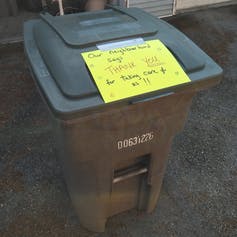 A sign thanking essential workers. (Scott Lear), Author provided
A sign thanking essential workers. (Scott Lear), Author provided
Saying thank you is probably one of the easiest but most heartfelt things we can do. People in cities around the world have been participating in signs of gratitude to health-care workers such as collectively clapping and making noise at 7 p.m. each night.
There are also many other people still working to keep our communities going, from the grocery store clerk to the letter carrier to those collecting the garbage each week. A simple note of thanks, or a wave out the window can go a long way.
Scott Lear writes the weekly blog Feel Healthy with Dr. Scott Lear.![]()
About The Author
Scott Lear, Professor of Health Sciences, Simon Fraser University
This article is republished from The Conversation under a Creative Commons license. Read the original article.

Related Books:
Caste: The Origins of Our Discontents
by Isabel Wilkerson
In this book, the author examines the history of racial oppression in America and explores how it continues to shape social and political structures today.
Click for more info or to order
Unbound: My Story of Liberation and the Birth of the Me Too Movement
by Tarana Burke
Tarana Burke, the founder of the Me Too movement, shares her personal story and discusses the impact of the movement on society and the fight for gender equality.
Click for more info or to order
Minor Feelings: An Asian American Reckoning
by Cathy Park Hong
The author reflects on her experiences as an Asian American and explores the complexities of racial identity, oppression, and resistance in contemporary America.
Click for more info or to order
The Purpose of Power: How We Come Together When We Fall Apart
by Alicia Garza
The co-founder of the Black Lives Matter movement reflects on her experiences as an activist and discusses the importance of community organizing and coalition building in the fight for social justice.
Click for more info or to order
How to Be an Antiracist
by Ibram X. Kendi
The author offers a guide for individuals and institutions to recognize and challenge racist beliefs and practices, and to actively work towards creating a more just and equitable society.


























